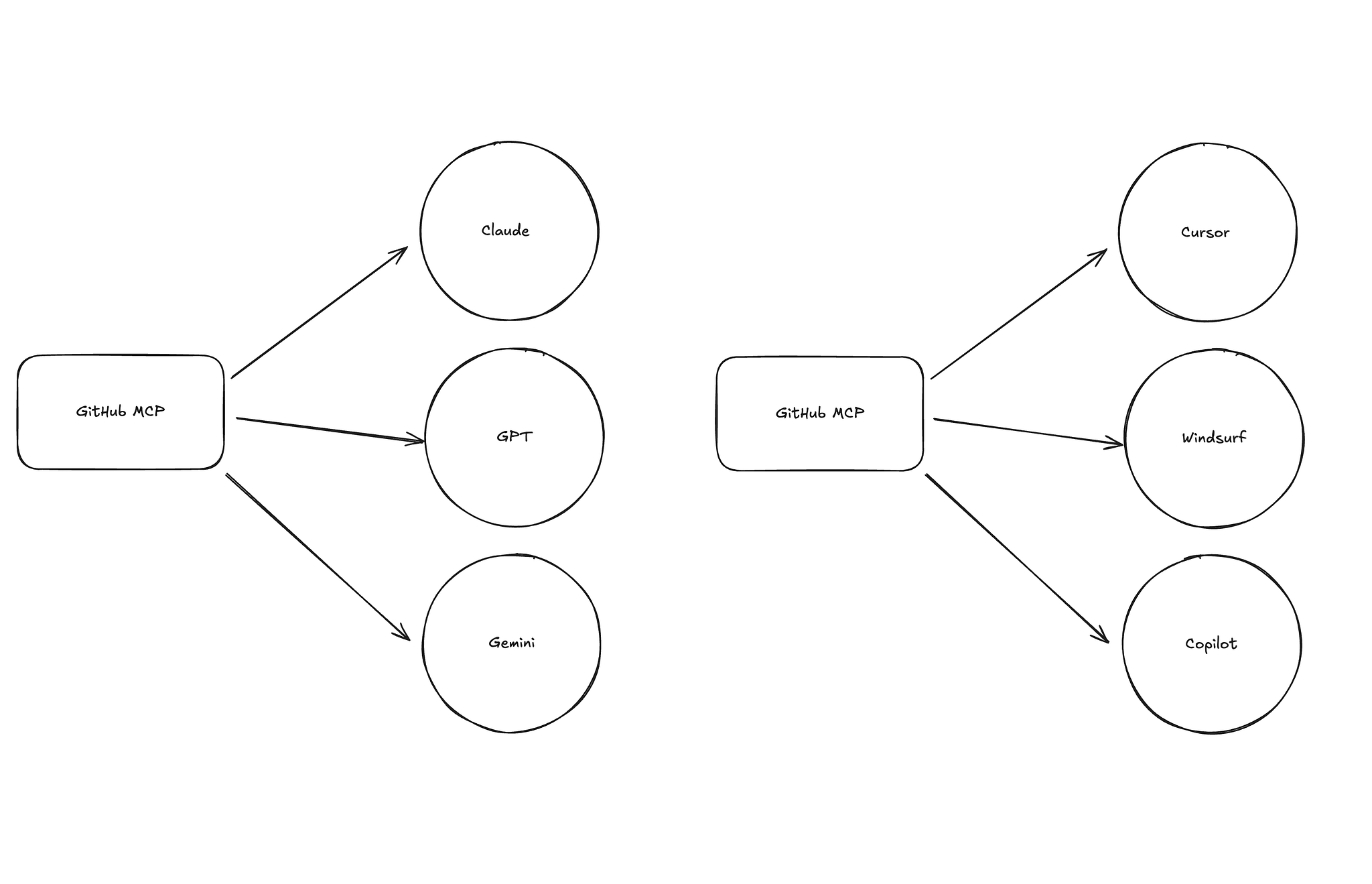4-5 Why Companies Are Racing to Build MCP Servers
May 12, 2025
This article is part of our Cursor workflow series for engineers.
I was reviewing GitHub's developer updates when I noticed something interesting. They've been quietly rolling out MCP server support. Then I saw similar announcements from other companies. Notion, Slack, even smaller developer tools—everyone seemed to be building MCP servers.
This got me thinking: why is everyone suddenly interested in MCP? What's driving this rush?
The answer reveals something fundamental about how companies view AI integration. It's not about avoiding disruption—it's about amplifying existing value.
The MCP Advantage
Let me explain what makes MCP compelling with a concrete example. Imagine you're GitHub, and you want to integrate with AI models. Without MCP, you'd need to build separate integrations for GPT, Claude, Gemini, and every other model that comes along. Each has different APIs, different authentication methods, different data formats.
With MCP, you build one server that speaks a standardized protocol. Every AI model that supports MCP can connect to your service immediately. It's like having a universal adapter for AI integration.

MCP was originally introduced by Anthropic (the company behind Claude). After Anthropic's announcement, other major AI companies quickly followed suit. OpenAI and Google both announced MCP support. Google's CEO even publicly endorsed MCP on Twitter.
The message was clear: this protocol matters. Any service that supports MCP can easily connect to different AI models. This explains why companies are racing to build their own MCP servers.
The GitHub Case Study
Let's look at GitHub's approach. Their core service is storing code and providing version control through Git. As they've grown, they've added many features, but code storage remains their foundation.
Here's what GitHub realized: AI won't replace the need for code storage. Engineers will always need somewhere to store and manage their code. But AI can dramatically enhance the value of that storage.
Through MCP, GitHub can offer integrated AI workflows. A developer finishes writing code, and GitHub's MCP server can automatically create a pull request. When a colleague leaves review comments, the developer can import those comments into Cursor through GitHub's MCP and ask AI to help implement the feedback.
Compare this to competitors who don't offer MCP integration. They're stuck providing basic code storage and version control. GitHub, meanwhile, can offer automated workflows that seamlessly connect with AI tools.
The key insight is that GitHub's core value—providing a place to store code—remains irreplaceable. But MCP allows them to amplify that value through AI integration.
The Strategic Question
This raises an important question for any company: should you build your own MCP server?
The answer depends on two factors:
First, do you provide something that AI can't replace? GitHub stores code. Notion stores documents. Slack facilitates team communication. These are foundational needs that persist regardless of AI advancement.
Second, can AI amplify your core value? If you're a database company, AI can help write queries and analyze data. If you're a design tool, AI can help generate assets and provide feedback. If you're a project management platform, AI can help automate workflows and generate reports.
If both answers are yes, then building an MCP server makes strategic sense. You're not trying to compete with AI—you're making AI work for you.
The Broader Pattern
What I find interesting is how this mirrors other platform shifts. When mobile apps became popular, companies didn't abandon their web services. They built mobile apps that enhanced their core offerings. When APIs became standard, companies didn't shut down their main products. They built APIs that made their services more valuable.
MCP represents a similar shift. Companies that embrace it early gain a competitive advantage. Those that ignore it risk being left behind, not because AI will replace them, but because their competitors will offer AI-enhanced versions of similar services.
The companies building MCP servers aren't afraid of AI disruption. They're using AI to create deeper moats around their existing businesses.
Support ExplainThis
If you found this content valuable, please consider supporting our work with a one-time donation of whatever amount feels right to you through this Buy Me a Coffee page.
Creating in-depth technical content takes significant time. Your support helps us continue producing high-quality educational content accessible to everyone.
